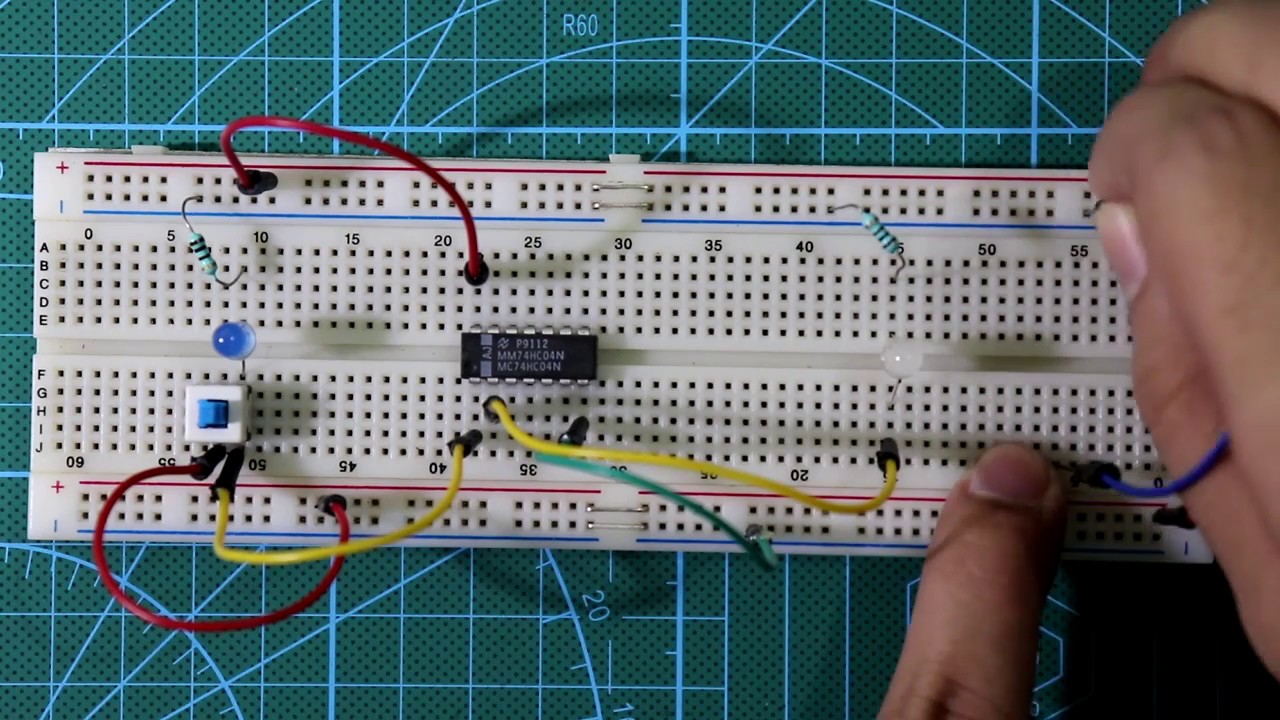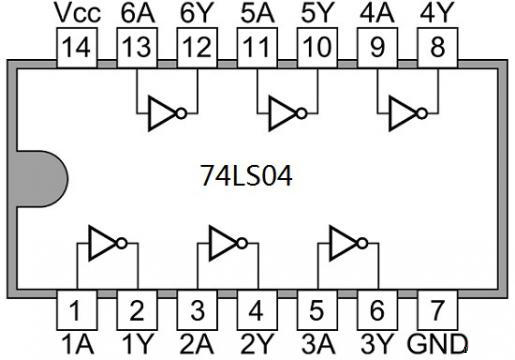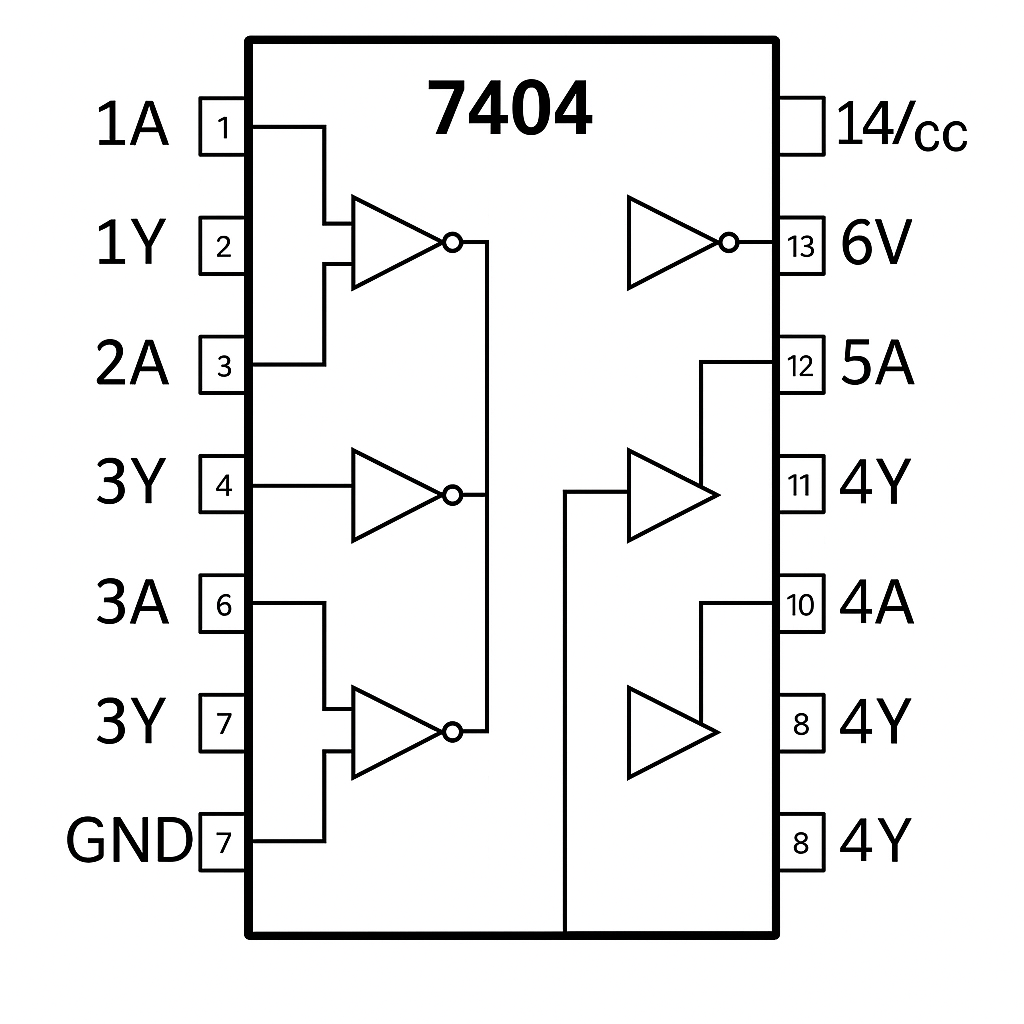
The 7404 is one of the most well-known and widely used logic ICs in digital electronics. It is a hex inverting IC, which means it consists of six individual inverters, each of which can invert a logic signal. These types of ICs are fundamental building blocks in the design of digital circuits, offering reliability, performance, and cost-effectiveness. In this article, we will explore the 7404 Integrated Circuit (IC) in depth, including its datasheet, pinout, pin diagram, and truth table. We'll also compare it with similar ICs and address common FAQs.
What is a 7404 Integrated Circuit (IC)?
An inverter is a logic gate that outputs the opposite of its input. For example, if the input is 0, the output will be 1, and if the input is 1, the output will be 0. This inversion is critical in various digital systems, such as oscillators, clock generators, and signal conditioning circuits.
The 7404 IC can be found in both TTL (Transistor-Transistor Logic) and CMOS (Complementary Metal-Oxide-Semiconductor) versions. Each of these variants has different characteristics, including power consumption, speed, and voltage requirements.
7404 IC Datasheet
The 7404 IC typically has the following specifications:
| Feature | Specification |
|---|---|
| Type | Hex Inverter (NOT Gate) |
| Package Type | Dual in-line package (DIP), Surface Mount (SMD) |
| Logic Family | TTL or CMOS |
| Supply Voltage | 4.75V to 5.25V (TTL) or 3V to 15V (CMOS) |
| Operating Temperature | -40°C to +85°C |
| Number of Gates | 6 inverters (NOT gates) |
| Input Voltage Level | TTL: 0V (LOW) and 2V (HIGH) |
| Output Voltage Level | TTL: 0V (LOW) and 5V (HIGH) |
| Power Consumption | Typically 1.6mA (TTL version) |
| Propagation Delay | Typically 15ns (TTL version) |
| Maximum Output Current | 6mA (sink), 6mA (source) |
Pinout and Pin Diagram

The 7404 IC is available in a 14-pin dual in-line package (DIP), which is commonly used in both educational and commercial applications. Below is the pinout of the 7404 IC. The 7404 hex inverter's adaptability makes it suitable for a diverse array of applications, from basic logic circuits to pulse generators and power inverters. Its reliability and low power consumption make it ideal for battery-powered devices. Noteworthy for its simplicity and user-friendly design, the hex inverter adheres to a standard pinout and operates seamlessly with a single 5V supply, facilitating integration into various circuits for applications ranging from breadboard prototypes to DIY electronics projects.
| Pin Number | Pin Description |
|---|---|
| 1 | Input 1 (A1) |
| 2 | Output 1 (Y1) |
| 3 | Input 2 (A2) |
| 4 | Output 2 (Y2) |
| 5 | Input 3 (A3) |
| 6 | Output 3 (Y3) |
| 7 | Ground (GND) |
| 8 | Input 4 (A4) |
| 9 | Output 4 (Y4) |
| 10 | Input 5 (A5) |
| 11 | Output 5 (Y5) |
| 12 | Input 6 (A6) |
| 13 | Output 6 (Y6) |
| 14 | VCC (Supply) |
7404 ic pin diagram
The 7404 IC, or the 7404 Hex Inverter, features a straightforward pinout configuration. It consists of six independent inverters, each represented by a specific pin.
The 7404 IC is a hex inverter, meaning it contains six independent NOT gates. It belongs to the 7400 series of TTL (Transistor-Transistor Logic) logic chips. Here is the 7404 IC pin diagram (14-pin Dual In-Line Package - DIP): Below is the pin diagram for the 7404 IC:

Key Notes: Each NOT gate (inverter) outputs the opposite logic level of its input. Common applications include signal inversion, digital logic circuits, and waveform generation.
7404 IC Truth Table
The 7404 IC, part of the six inverter series, features a truth table that explains the relationship between the input and output states of its six inverters. Each inverter acts as a basic logic gate known as a "NOT" gate, producing an output that is the logical complement of its input. The truth table for the 7404 IC is quite simple. Since each gate in the 7404 is a NOT gate, the truth table applies to each individual gate. Below is the truth table for a single NOT gate (inverter) in the 7404.
This truth table uniformly applies to all six inverters within the 7404 IC. Specifically, when the input (A) is 0, the output (Y) is set to 1, and vice versa, when the input is 1, the output switches to 0. This binary opposition between input and output underscores the inverter's role in digital circuits, where flipping signal states is necessary for logic operations.
| Input (A) | Output (Y) |
|---|---|
| 0 | 1 |
| 1 | 0 |
For the complete 7404 IC with six inverters, the truth table would look as follows:
| Input (A1 to A6) | Output (Y1 to Y6) |
|---|---|
| 0 | 1 |
| 1 | 0 |
Each of the six inverters operates independently, so you can think of the 7404 IC as a series of six inverters, each with a separate input and output.
Functionality of the IC 7404
The 7404 IC functions as a NOT gate, and its primary purpose is to invert the input signals.
• NOT Gate Operation
The 7404 IC contains six individual NOT gates, also known as inverters. Each inverter performs a logical inversion on its input signal.
• Logical Inversion
The output of each inverter is the logical co•mplement (opposite) of its input state. When the input is high (1), the output is low (0), and when the input is low (0), the output is high (1).
• Universal Logic Function
The NOT gate is a fundamental building block in digital logic circuits. It can be used to construct more complex logical operations and is a key component in the design of various electronic systems.
• Six Independent Inverters
The 7404 IC conveniently integrates six independent inverters into a single package. Each inverter within the IC operates autonomously, allowing for multiple inversion functions in one unit.
7404 IC serves as a versatile NOT gate, providing logical inversion for six independent signals. Its simplicity and ubiquity make it a fundamental component in digital electronics and a crucial building block for constructing various logical functions and circuits.
7404 IC Comparison Table
The 7404 IC is not the only logic gate IC in the 7400 series. Below is a comparison table that highlights the differences between the 7404 and other similar ICs in the series.
| IC | Number of Gates | Type of Gates | Package Type | Logic Family | Propagation Delay | Supply Voltage |
|---|---|---|---|---|---|---|
| 7404 | 6 | Inverters (NOT gates) | DIP, SMD | TTL, CMOS | 15ns (TTL) | 4.75V to 5.25V (TTL) |
| 7408 | 4 | AND gates | DIP, SMD | TTL, CMOS | 15ns (TTL) | 4.75V to 5.25V (TTL) |
| 7432 | 4 | OR gates | DIP, SMD | TTL, CMOS | 15ns (TTL) | 4.75V to 5.25V (TTL) |
| 7402 | 4 | NOR gates | DIP, SMD | TTL, CMOS | 15ns (TTL) | 4.75V to 5.25V (TTL) |
| 7400 | 4 | NAND gates | DIP, SMD | TTL, CMOS | 15ns (TTL) | 4.75V to 5.25V (TTL) |
The 7404 IC is ideal for applications where signal inversion is needed, while other gates like the 7408 (AND) or 7432 (OR) are better suited for different types of logic operations.
Equivalents of IC 7404
The IC 7404, being a part of the 74XXX series, has equivalents and replacements that serve similar functions in various applications. Two common alternatives to the 7404 are the CD7404 and 74LS14.
• CD7404
The CD7404 is functionally equivalent to the 7404, serving as a hex inverter with six independent inverters. It is generally compatible with circuits designed for the 7404 and can often be used as a drop-in replacement.
• 74LS14
The 74LS14 is another equivalent to the 7404, providing six inverters with Schmitt-trigger inputs. The Schmitt-trigger inputs can offer better noise immunity in certain applications compared to the standard 7404.
Note:
Pin Compatibility: When replacing the 7404 with equivalents, it's crucial to ensure pin compatibility to facilitate a seamless substitution.
Voltage and Current Ratings: Check voltage and current ratings to confirm that the replacement can handle the specific requirements of the circuit.
Additional Features: Depending on the application, consider whether additional features, such as Schmitt-trigger inputs in the 74LS14, may be advantageous.
Applications of the 7404 Hex Inverter
• Logic Gates
The 7404 hex inverter is widely employed in the creation of logic gates, such as NAND and NOR gates. When multiple inverters are combined, they can form the building blocks for more complex logical operations.
• Oscillators
In oscillator circuits, the 7404 hex inverter is utilized to generate periodic waveforms. Its ability to invert signals is harnessed to create oscillating outputs, crucial in clock generation and frequency synthesis.
• Power Supplies
The 7404 is often integrated into power supply circuits to manage and control signals. Its role in logic inversion proves valuable in maintaining stable power supply conditions.
• LED Drivers
The 7404 hex inverter is utilized in LED driver circuits where it helps control and drive LEDs. Its ability to invert signals is leveraged to manage the switching of LEDs efficiently.
• Appliances Using Logical Inverters
Appliances with logical inverters, such as consumer electronics, may utilize the 7404 for various control and signal processing tasks.
• Memory Units and Storage Applications
In memory units and storage applications, the 7404 can play a role in signal conditioning and control within the digital storage and retrieval processes.
• PCs and Notebooks
The 7404 hex inverter may find application in PCs and notebooks for tasks involving logical signal processing, interfacing, or control functions.
• Various Digital Electronics
Its broad compatibility and simplicity make the 7404 suitable for a myriad of digital electronic applications, providing logical inversion where needed.
• Networking Gadgets and Systems
In networking devices and systems, the 7404 may be used for signal conditioning, logic processing, or interfacing within the broader digital communication framework.
• Digital Systems
The 7404 hex inverter is a fundamental component in the design of digital systems, contributing to logical operations, signal conditioning, and control functions.
Frequently Asked Questions (FAQs)
Q1: What is the difference between TTL and CMOS versions of the 7404?
• TTL (Transistor-Transistor Logic) is faster but consumes more power than CMOS (Complementary Metal-Oxide-Semiconductor). The CMOS version of the 7404 operates with lower power consumption and has a wider supply voltage range, making it suitable for battery-powered devices.
Q2: How do I use the 7404 IC in my circuit?
• The 7404 IC can be used in circuits where signal inversion is required. It is commonly used in clock generators, oscillators, and logic level inversion circuits.
Q3: Can I use the 7404 IC with 3.3V logic levels?
• The TTL version of the 7404 requires a 5V supply to operate properly, while the CMOS version can work with lower voltages, such as 3.3V. Always check the datasheet for the specific version you're using.
Q4: Can the 7404 IC drive large loads?
• The 7404 is designed to drive small loads. It can sink or source a maximum of 6mA of current. For larger loads, additional components like transistors or buffers may be needed.
Q5: What are common applications of the 7404 IC?
• The 7404 IC is used in a variety of digital circuits, including oscillators, waveform generators, signal inversion, logic circuits, and more.
Conclusion
The 7404 Integrated Circuit (IC) is an essential component in digital electronics, providing reliable inverting logic gates that are widely used in various applications. By understanding the datasheet, pinout, pin diagram, and truth table, you can effectively implement this versatile IC into your circuits. Whether you are designing digital systems or simply learning about logic gates, the 7404 IC is a great starting point.
7404 Integrated Circuit stands as a stalwart in the world of digital electronics, providing a fundamental tool for circuit designers and electronic enthusiasts alike. Through this datasheet, we have explored the essential details encompassing the 7404 IC, from its pinout and pin diagram to its truth table, shedding light on its operational intricacies. As technology continues to advance, the 7404 IC remains relevant and applicable, contributing to the construction of diverse digital circuits. If you need to source high-quality 7404 ICs or any other electronic components, AIChipLink, your trusted semiconductor distributor, can help.
Read More:
• Broadcom BCM2712 Processor: Benchmarks, Tests, and Specifications
• Broadcom BCM57412 vs. BCM57414 vs. BCM57416: Which Ethernet Controller is Right for You?
• Broadcom BCM6765, BCM47722 & BCM4390: Which Wi-Fi 7 Chip is Right for You?
• Comprehensive Guide to the Broadcom’s 9400 Series Tri-Mode Storage HBAs
Written by Jack Zhang from AIChipLink.
AIChipLink, one of the fastest-growing global independent electronic component distributors in the world, offers millions of products from thousands of manufacturers, and many of our in-stock parts is available to ship same day.
We mainly source and distribute integrated circuit (IC) products of brands such as Broadcom, Microchip, Texas Instruments, Infineon, NXP, Analog Devices, Qualcomm, Intel, etc., which are widely used in communication & network, telecom, industrial control, new energy and automotive electronics.
Empowered by AI, Linked to the Future. Get started on AIChipLink.com and submit your RFQ online today!